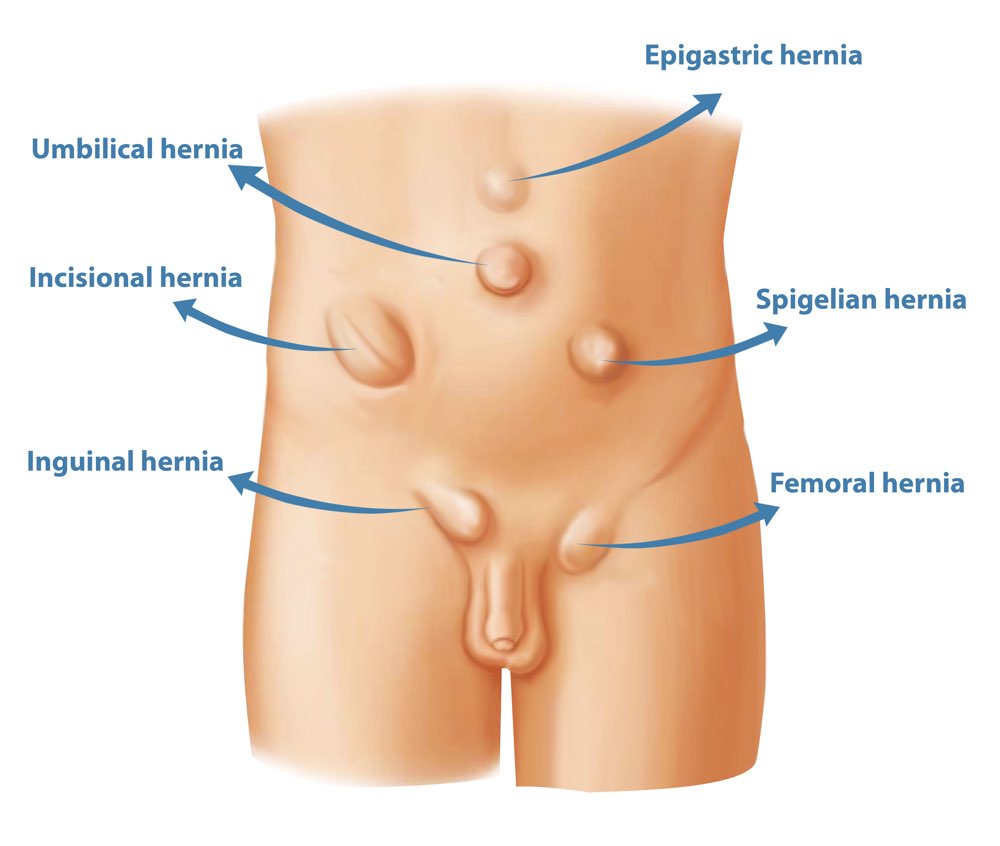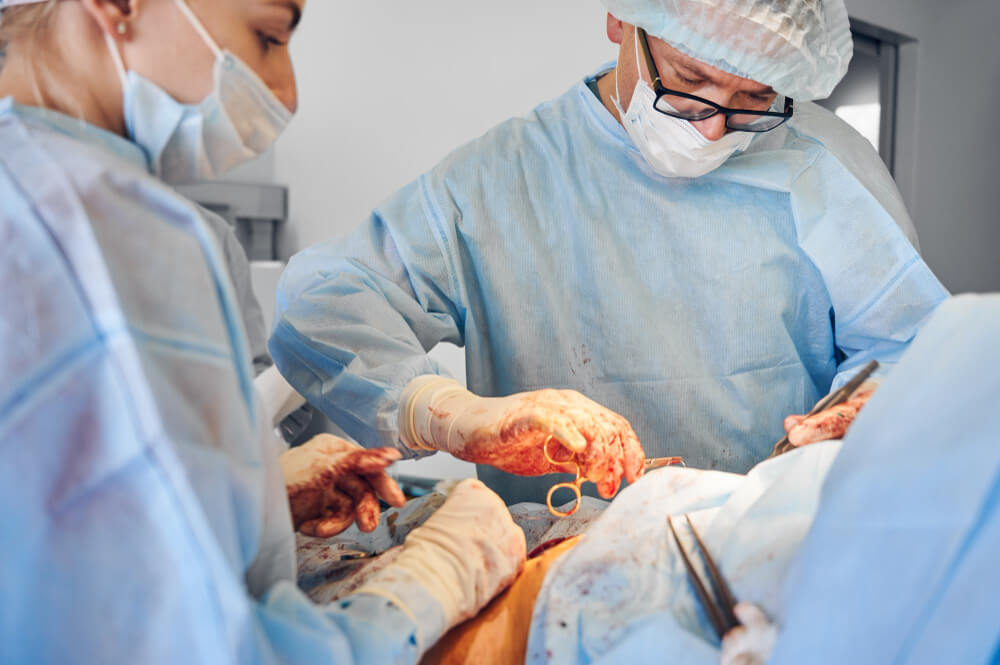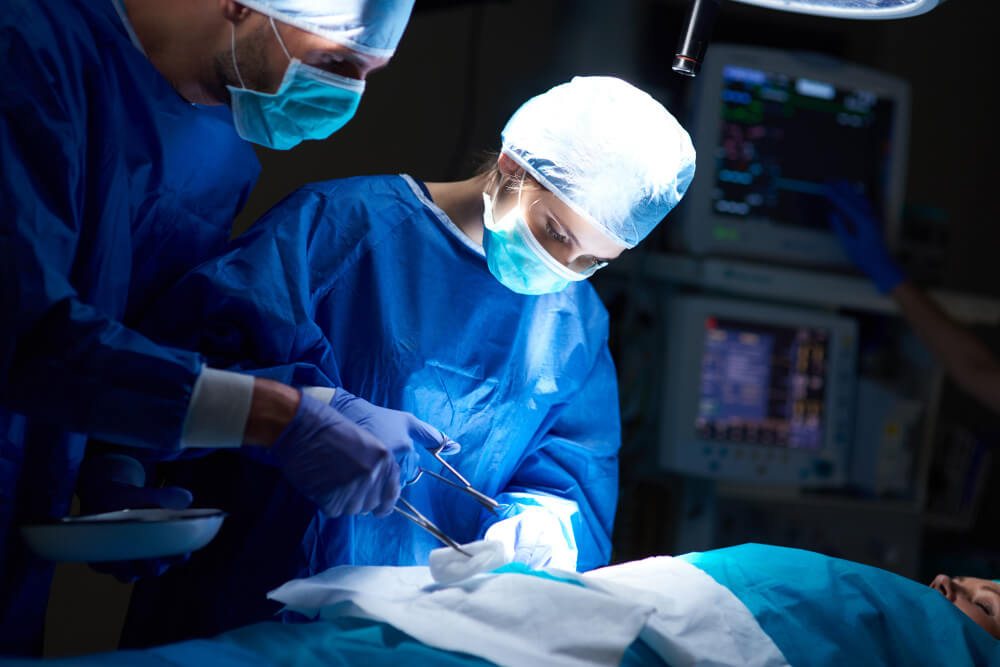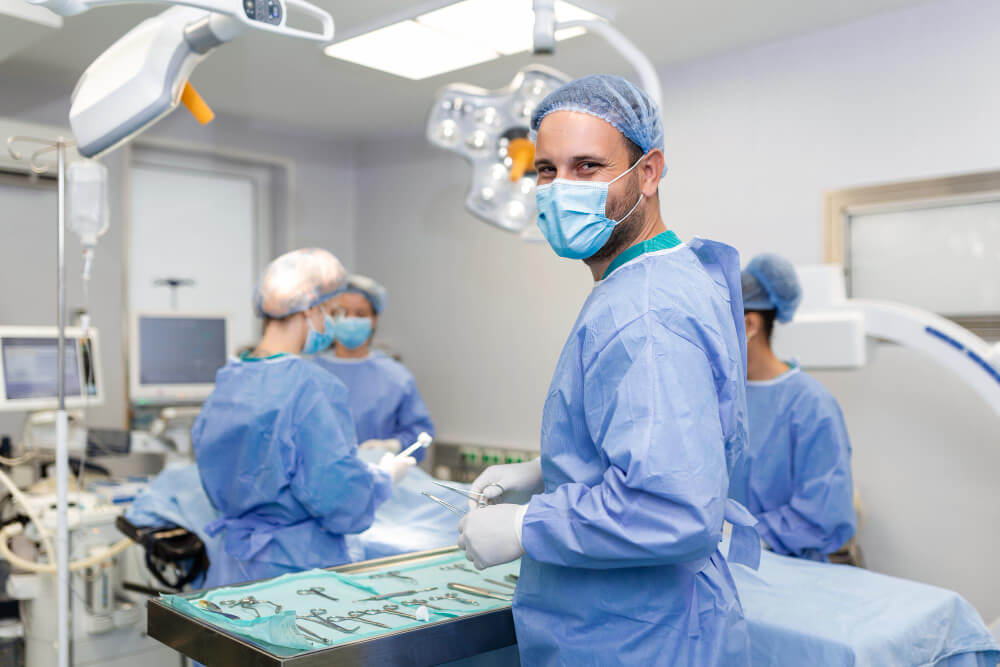

A hernia occurs when an organ or tissue pushes through a weak area in the surrounding muscle or connective tissue. This condition can occur in various parts of the body but is most commonly found in the abdominal area. Understanding hernias is crucial for recognizing symptoms and seeking appropriate treatment.

There are several types of hernias, each with distinct characteristics and locations in the body. Knowing the types of hernias can help in identifying and understanding the specific condition.


Recognizing the symptoms of a hernia is crucial for early diagnosis and effective treatment. Hernias can present with a variety of symptoms that can affect daily life.
One of the most noticeable symptoms is a bulge or lump in the affected area. This bulge may become more apparent when standing up or coughing and may disappear when lying down.
Hernias can cause pain or discomfort, especially when engaging in physical activities such as lifting, coughing, or bending over. The pain can range from a dull ache to sharp, severe pain.
Some individuals may experience a burning or aching sensation at the site of the bulge. This feeling can be constant or come and go.
A feeling of weakness, pressure, or heaviness in the abdomen is another common symptom. This feeling may worsen throughout the day, especially after prolonged standing or physical exertion.
Early diagnosis of a hernia is essential to prevent complications such as obstruction or strangulation. Obstruction occurs when the herniated tissue becomes trapped, leading to bowel obstruction symptoms like nausea, vomiting, and severe abdominal pain. Strangulation, a more severe complication, happens when the blood supply to the herniated tissue is cut off, requiring emergency surgery. If you experience any of these symptoms, seek medical attention promptly.
Laparoscopic hernia surgery in Delhi offers numerous advantages over traditional open surgery. This minimally invasive technique has become increasingly popular due to its many benefits.
In Delhi, many top hospitals and surgeons specialize in laparoscopic hernia surgery. The city’s medical infrastructure, combined with the expertise of its surgeons, makes it an ideal location for this procedure. Patients can benefit from the latest surgical techniques and state-of-the-art facilities, ensuring high-quality care and successful outcomes.

Choosing the right surgeon is vital for a successful hernia treatment. The best hernia surgeon in Delhi should have extensive experience, specialized training, and a track record of successful surgeries.

Delhi is home to many renowned hernia surgeons who are recognized for their expertise and successful track records. Plusify can help you find the best hernia surgeon in Delhi by providing detailed profiles, patient reviews, and the ability to book consultations easily. This ensures that you receive top-notch care from highly qualified professionals.
Laparoscopic hernia treatment in Delhi offers several benefits that make it a preferred choice for many patients. This modern surgical technique provides numerous advantages over traditional methods.
Delhi’s medical community offers some of the best laparoscopic treatments in the country. The city’s top hospitals are equipped with state-of-the-art technology and staffed by experienced surgeons specializing in laparoscopic procedures. Patients can expect high-quality care, personalized treatment plans, and excellent outcomes.
Selecting the right hospital is crucial for optimal hernia treatment outcomes. The best hospital for hernia surgery in Delhi should offer advanced facilities, experienced surgeons, and comprehensive patient care services.

Delhi boasts several top-tier hospitals known for their excellence in hernia surgery. Plusify can assist you in finding the best hospital for hernia surgery in Delhi by providing detailed information on hospital facilities, surgeon credentials, and patient reviews. This helps you make an informed decision and ensures you receive the highest standard of care.
Grasping the expenses of hernia surgery is crucial for effective planning and informed decision-making. Several factors influence the hernia surgery cost in Delhi.
To get an accurate estimate of hernia surgery cost in Delhi, consider consulting with multiple hospitals and surgeons. This enables you to evaluate various prices and services, helping you choose the most suitable option for your requirements and budget. Plusify can help you book appointments and consultations with top hernia surgeons, ensuring you receive the best care at a reasonable cost. Additionally, Plusify’s platform provides detailed information on cost estimates, helping you plan your treatment without financial surprises. your treatment without financial surprises.
Laparoscopic hernia surgery is a modern, minimally invasive technique designed to repair hernias efficiently and with minimal disruption to the patient’s body. During the surgery, a surgeon makes several small incisions in the abdomen and inserts a laparoscope (a thin tube with a camera) to view the hernia and guide the repair. Surgical instruments are used to push the herniated tissue back into place and reinforce the weakened area with a mesh.
1. Smaller Incisions: Laparoscopic surgery involves smaller cuts, which leads to less pain and scarring.
2. Faster Recovery: Patients typically experience a quicker recovery time and shorter hospital stays.
3. Reduced Risk of Infection: Smaller incisions reduce the risk of infection and complications.
4. Less Postoperative Pain: Patients often report less pain compared to traditional open surgery.
5. Quicker Return to Normal Activities: Many patients return to normal activities sooner than those who undergo open surgery.
A: Candidates for laparoscopic hernia surgery typically include: 1. Patients with hernias that are not too large or complex.
2. Individuals in good overall health with no contraindications for general anesthesia.
3. Patients who have not had extensive abdominal surgeries that could cause adhesions.
4. People seeking a quicker recovery and less postoperative pain.
The duration of laparoscopic hernia surgery varies but generally takes about 1 to 2 hours. The exact time depends on the size and complexity of the hernia, as well as the patient’s overall health.
Recovery time varies, but most patients can return to normal activities within 1 to 2 weeks. Full recovery and the ability to engage in strenuous activities usually occur within 4 to 6 weeks.
A.While laparoscopic hernia surgery is generally safe, potential risks and side effects include:
Infection at the incision sites.
Bleeding or blood clots.
Injury to surrounding tissues or organs.
Recurrence of the hernia.
Adverse reactions to anesthesia.
A: During recovery, you can expect:
1. Mild pain and discomfort around the incision sites.
2. You will need to avoid heavy lifting and strenuous activities for several weeks to ensure proper healing and prevent complications.
3. Gradual return to normal activities, with a focus on rest and hydration.
4. Follow-up appointments to monitor healing and ensure no complications.
The cost of laparoscopic hernia surgery in Delhi can vary widely depending on factors such as the hospital, surgeon’s fees, and the complexity of the hernia. For accurate pricing, it is advisable to consult directly with hospitals or clinics.
While surgery is the definitive treatment for hernias, some small or asymptomatic hernias can be managed with lifestyle changes, such as weight management, avoiding heavy lifting, and wearing a supportive truss. However, these methods do not repair the hernia and are typically temporary measures.
A: Preparation steps for laparoscopic hernia surgery include
: 1. Undergoing preoperative assessments, such as blood tests and imaging studies.
2. Be sure to discuss your complete medical history and all medications you are currently taking with your surgeon..
3. Stopping certain medications, such as blood thinners, as advised by your doctor.
4. Fasting for a specific period before the surgery (usually 6-8 hours).
5. Arrange for someone to drive you home after the procedure and assist you during the initial recovery period.
Answer: Post-operative care typically includes managing pain with prescribed medications, avoiding heavy lifting or strenuous activities, keeping the incision sites clean and dry, and attending follow-up appointments with your surgeon.
Answer: Most patients can return to work within 1 to 2 weeks, depending on the nature of their job and their individual recovery. Those with physically demanding jobs may need a longer period off.
Answer: Light activities can usually be resumed within a few days. However, strenuous activities and heavy lifting should be avoided for at least 4 to 6 weeks or as advised by your surgeon.
Answer: Pain can be managed with prescribed medications, over-the-counter pain relievers, and applying ice packs to the surgical area. Follow your surgeon’s advice on pain management and care.
Answer: Maintaining a healthy weight, avoiding heavy lifting, and engaging in regular exercise (as advised by your surgeon) can help prevent hernia recurrence and promote overall health.
Answer: Watch for signs such as severe pain, fever, redness or swelling at the incision site, unusual discharge, or difficulty urinating. Contact your healthcare provider if you experience any of these symptoms.
Answer: Many insurance plans cover laparoscopic hernia surgery, though coverage details can vary. Check with your insurance provider to understand the extent of coverage, including preoperative, surgical, and postoperative costs.
Answer: Yes, bilateral hernia repairs (both sides) can be performed during a single laparoscopic procedure if necessary. Your surgeon will assess whether this approach is appropriate for your condition.
Answer: Look for experienced surgeons with specialized training in laparoscopic hernia repair. Research their credentials, patient reviews, and hospital affiliations. Consider scheduling consultations to discuss your case and treatment options.
Answer: Laparoscopic hernia surgery generally has a high success rate, with many patients experiencing effective hernia repair and minimal recurrence. Success rates can vary based on individual factors and the surgeon’s expertise.